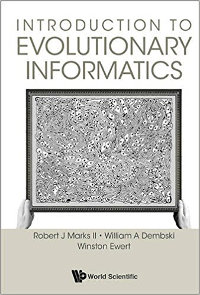 An article about a book titled Introduction to Evolutionary Informatics starts out like this:
An article about a book titled Introduction to Evolutionary Informatics starts out like this:
Five years ago, Gregory Chaitin, a co-founder of the fascinating and mind-bending field of algorithmic information theory, offered a challenge:
The honor of mathematics requires us to come up with a mathematical theory of evolution and either prove that Darwin was wrong or right!
In Introduction to Evolutionary Informatics, co-authored by William A. Dembski, Winston Ewert, and myself, we answer Chaitin’s challenge in the negative: There exists no model successfully describing undirected Darwinian evolution. Period. By “model,” we mean definitive simulations or foundational mathematics required of a hard science.
The article is very interesting in its own right, but I am also looking forward to reading the book. I am sure the whole book is worth a read, but my interest got piqued in particular by a some statements in the article about the measurement of meaning in information:
8. Information theory cannot measure meaning.
Poppycock.
…
The manner in which information theory can be used to measure meaning is addressed in Introduction to Evolutionary Informatics. We explain, for example, why a picture of Mount Rushmore containing images of four United States presidents has more meaning to you than a picture of Mount Fuji even though both pictures might require the same number of bits when stored on your hard drive. The degree of meaning can be measured using a metric called algorithmic specified complexity.
Rather than summarize algorithmic specified complexity derived and applied in Introduction to Evolutionary Informatics, we refer instead to a quote from a paper from one of the world’s leading experts in algorithmic information theory, Paul Vitányi. The quote is from a paper he wrote over 15 years ago, titled “Meaningful Information.”22
One can divide…[KCS] information into two parts: the information accounting for the useful regularity [meaningful information] present in the object and the information accounting for the remaining accidental [meaningless] information.23
In Introduction to Evolutionary Informatics, we use information theory to measure meaningful information and show there exists no model successfully describing undirected Darwinian evolution.
The entire world may one day be judged by these stupid MMORPGs. Historically, they will even make a joke of evolution.
If humans can create entire virtual worlds where all sorts of creatures live, die, resurrect, etc. how can we for one moment question that an intelligent designer might be able to do the same in our reality.
Humans create all sorts of otherworldly creatures in MMORPG’s. They create surreal and unreal creatures and artifacts within these games for whatever reasons they choose. Why should God be more limited than the creators of multi-user games?
Imagine you are the creator and developer of an MMORPG. How would you code the game so that your virtual creatures COULD become sentient, moral and then saved? My limited human mind has yet to figure out a better way to do it than by the MMORPG “game” of life created by God.
Mark my word, the eternal judgement of the techies and technocrats will be their own virtual creations.
Something to think about.
I love this! Spot on. Christian is working in precisely the same area of information theory as the guy who wrote the article. Very, very interesting field and it truly works against the blind watchmaker theory. Going to call.